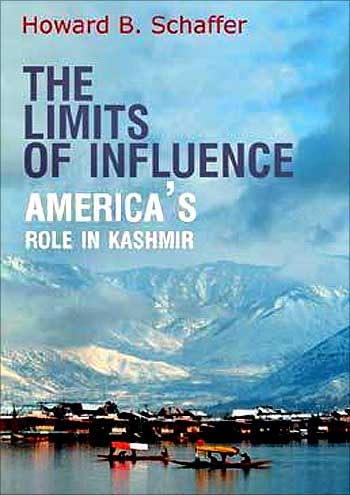Howard B Schaffer’s The Limits of Influence: America’s Role in Kashmir
No book on South Asia published in recent years has received the kudos veteran diplomat Howard B Schaffer’s The Limits of Influence: America’s Role in Kashmir, published by Brookings Institution Press, elicited.
Schaffer, currently deputy director and director of studies of the Institute for the Study of Diplomacy at Georgetown University’s Edmund A Walsh School of Foreign Service, is a 36-year veteran of the US Foreign Service and has served as ambassador to Bangladesh (1984 to 1987), and as political counselor in India (1977 to 1979) and Pakistan (1974 to 1977).
Howard Schaffer’s outstanding book is must reading not only for those interested in the long-standing dispute between India and Pakistan over the Kashmir region, but also for anyone interested in understanding the current conflicts in Central Asia. Although the book concentrates on the roles played by the United States over decades in seeking a solution for Kashmir, at the same time it provides a detailed outline of that conflict from its genesis to its current impact on geopolitics in Asia. With extensive experience as a Foreign Service officer in South Asia, culminating in his tour as ambassador to Bangladesh in the 1980s, Schaffer is among the few who have both the on-the-ground experience and broader Washington perspective to cover this topic thoroughly.
The Kashmir problem began with the 1947 partition of British India into the independent states of India and Pakistan, a process that cost perhaps a million lives and dislocated millions more. The Hindu maharaja of largely-Muslim Kashmir dithered when faced with the decision of which country to join, and within months an uprising by Kashmiri Muslim veterans of the old British Indian army was underway, soon joined by tribal fighters from Pakistan. India responded to the maharaja’s appeal for help by insisting it would come to his aid only if Kashmir were part of India. As conflict continued, both sides called upon the infant United Nations to resolved the dispute, beginning the long, sad tale of foreign involvement. By 1949 Kashmir was in essence divided, the western and northern part occupied by Pakistan, the rest under Indian control.
Over the years India and Pakistan have fought at least three wars over Kashmir and have engaged in numerous skirmishes along the de facto border. Kashmir was a principle cause of the civil war in 1971 that resulted in East Pakistan gaining independence as Bangladesh.

